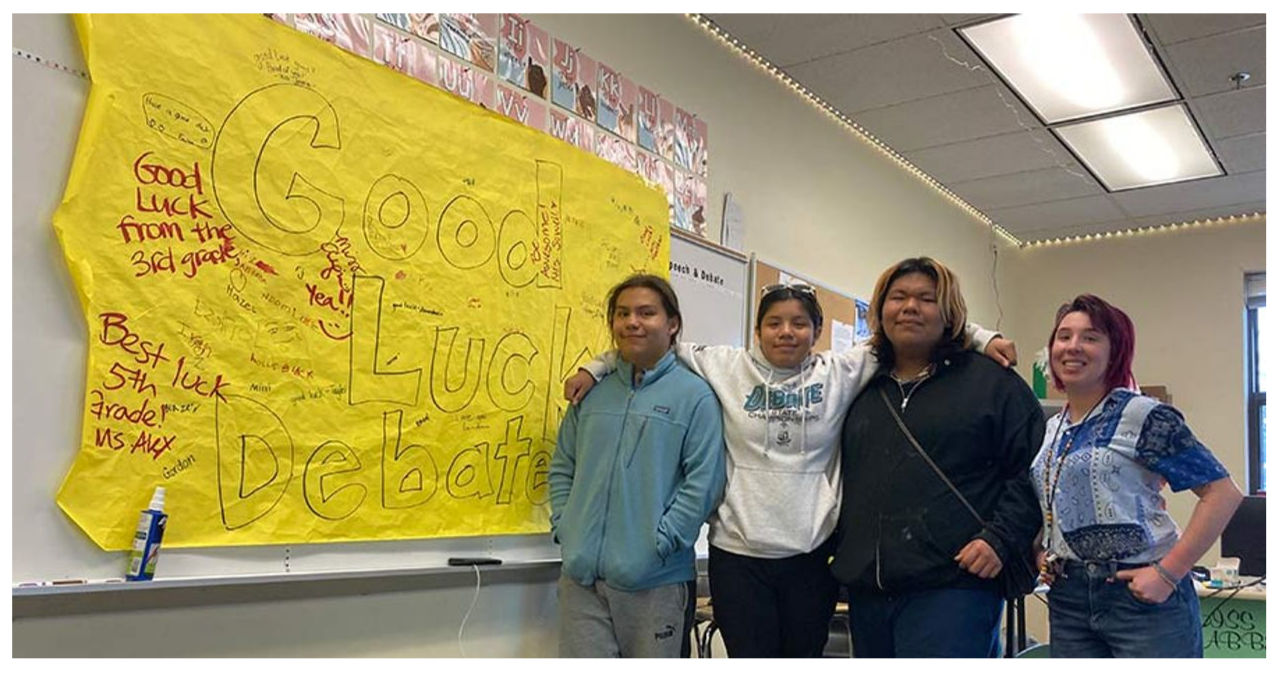FORT HALL — Three indigenous students from a local school in Idaho have made history by becoming the first students from an all-indigenous school to qualify for speech and debate nationals.
Three students from Shoshone-Bannock Jr./Sr. High School, namely Luzahan Matsaw, Aiyana Eschief, and Seth Stacey, will be participating in the informative speaking category at the upcoming National Speech & Debate Tournament. Taking place in Des Moines, Iowa, the tournament is scheduled to run from June 16 to 21.
Stacey expressed her pride in being part of a monumental moment for her community. She stated, “This is a significant achievement for us as we are creating history for our people. It fills me with pride to have contributed to this historic event.”
Matsaw and Eschief, both 16-year-old sophomores, along with Stacey, a 14-year-old eighth grader, are embarking on their first year of competing in speech and debate.
When Abbey Vaughn was hired as an English teacher, she sparked the students’ interest in debate, leading to the formation of the school’s inaugural speech and debate team. To enhance their experience, she collaborated with Jett Smith, the coach of the debate team at Highland High School, resulting in the creation of a co-debate team that allowed them to travel together.
Throughout their inaugural year of competition, the students have gained valuable insights on how to cultivate self-assurance in themselves and their vocal abilities.
Competing has been instrumental in helping Stacey improve his stutter and become more outgoing.
“I take pride in that,” Stacey affirmed. “I have improved my speech skills, even though I still stutter at times. It has greatly assisted me in maintaining my composure during conversations.”
Learning enough about different subjects so that Matsaw can engage in debates from both sides has significantly boosted his confidence in his knowledge.
Matsaw emphasized the importance of learning from both positive and negative experiences, stating, “Whether you’re facing criticism or receiving praise, it’s an opportunity to develop confidence. It allows you to discern the weaknesses in your opponent’s arguments and shift your focus accordingly.”
Competing in speech and debate has transformed Eschief, empowering her to become a confident speaker. Previously uninterested, she is now motivated to run for a position on the Fort Hall Business Council.
Eschief mentioned that she didn’t even consider it until she joined speech and debate. She explained that her confidence grew significantly as she became more comfortable with public speaking.
Informative speaking falls under a category in which students select a topic and deliver an informational speech about it. The emphasis is not only on the delivery of the speech but also on the content it encompasses.
Matsaw is gearing up to deliver an enlightening speech on one of his greatest passions: horror games. While he has always been captivated by the horror genre as a whole, his recent fascination has shifted towards the world of gaming.
“I really aspire to do something similar,” Matsaw expressed his hopes. “I want to pursue an education in this field and create amazing things like that.”
Eschief is preparing to deliver an enlightening speech on a topic that deeply resonates with her – residential schools. During her speech, she will delve into the disturbing history of these schools, which were established with the intention of eradicating the rich cultural heritage of indigenous communities, all under the pretense of improving their lives.
According to Eschief, children were compelled to attend residential schools due to the belief held by white settlers that they were lacking in both religious and hygienic practices. The settlers considered them to be uncultured.
According to Eschief, many people tend to dismiss history, but she strongly believes that it holds great significance as a valuable source of learning. She emphasizes that a significant portion of history is meant to remain in the past.
Eschief expressed a strong desire to further showcase and express her culture, stating, “It’s an integral part of my culture, and I want to share and highlight it more.”
Stacey is set to deliver a speech addressing the urgent matter of missing and murdered indigenous people. This is a grave issue that predominantly impacts indigenous women and girls, although all indigenous individuals face a heightened risk of being either found murdered or going missing.
Stacey expressed her concerns about the rising dangers faced by the new generation. She highlighted the fear of becoming another statistic, another missing or murdered indigenous person.
Stacey emphasized the significance of making others aware of their continued presence, expressing pride in their indigenous heritage and striving to lead fulfilling lives.
“I am proud to witness the growth of my students in their first year of debate,” Vaughn expressed. She further added, “It’s incredible to see them finding their voice, expressing their thoughts, and becoming more assertive about their desires. It’s truly remarkable to be able to assist them in making a significant impact.”
Reflecting on his journey as a debater, Matsaw acknowledges the significance of being the first student from an all-indigenous school in Idaho to participate in nationals.
Matsaw reflects on their journey in speech and debate, acknowledging that they started with little knowledge in the beginning. However, they have come a long way and have learned valuable skills in effective communication, including speaking techniques and preparation strategies.
Eschief believes that she has been presented with numerous opportunities in life as a result of the valuable lessons she has learned through her participation in debate.
Stacey mentioned that if debate had been available to previous students at their school, they would have definitely made use of it.
Stacey shared that she had received positive feedback from graduates who expressed their desire for more opportunities like the one she had provided.



